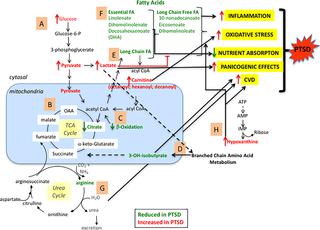Our official English website, www.x-mol.net, welcomes your feedback! (Note: you will need to create a separate account there.)
Metabolomic analysis of male combat veterans with post traumatic stress disorder.
PLOS ONE ( IF 3.7 ) Pub Date : 2019-03-18 , DOI: 10.1371/journal.pone.0213839 Synthia H Mellon 1 , F Saverio Bersani 2 , Daniel Lindqvist 2 , Rasha Hammamieh 3 , Duncan Donohue 3 , Kelsey Dean 4 , Marti Jett 3 , Rachel Yehuda 5 , Janine Flory 5 , Victor I Reus 2 , Linda M Bierer 5 , Iouri Makotkine 5 , Duna Abu Amara 6 , Clare Henn Haase 6 , Michelle Coy 2 , Francis J Doyle 4 , Charles Marmar 6, 7 , Owen M Wolkowitz 2
PLOS ONE ( IF 3.7 ) Pub Date : 2019-03-18 , DOI: 10.1371/journal.pone.0213839 Synthia H Mellon 1 , F Saverio Bersani 2 , Daniel Lindqvist 2 , Rasha Hammamieh 3 , Duncan Donohue 3 , Kelsey Dean 4 , Marti Jett 3 , Rachel Yehuda 5 , Janine Flory 5 , Victor I Reus 2 , Linda M Bierer 5 , Iouri Makotkine 5 , Duna Abu Amara 6 , Clare Henn Haase 6 , Michelle Coy 2 , Francis J Doyle 4 , Charles Marmar 6, 7 , Owen M Wolkowitz 2
Affiliation

|
Posttraumatic stress disorder (PTSD) is associated with impaired major domains of psychology and behavior. Individuals with PTSD also have increased co-morbidity with several serious medical conditions, including autoimmune diseases, cardiovascular disease, and diabetes, raising the possibility that systemic pathology associated with PTSD might be identified by metabolomic analysis of blood. We sought to identify metabolites that are altered in male combat veterans with PTSD. In this case-control study, we compared metabolomic profiles from age-matched male combat trauma-exposed veterans from the Iraq and Afghanistan conflicts with PTSD (n = 52) and without PTSD (n = 51) ('Discovery group'). An additional group of 31 PTSD-positive and 31 PTSD-negative male combat-exposed veterans was used for validation of these findings ('Test group'). Plasma metabolite profiles were measured in all subjects using ultrahigh performance liquid chromatography/tandem mass spectrometry and gas chromatography/mass spectrometry. We identified key differences between PTSD subjects and controls in pathways related to glycolysis and fatty acid uptake and metabolism in the initial 'Discovery group', consistent with mitochondrial alterations or dysfunction, which were also confirmed in the 'Test group'. Other pathways related to urea cycle and amino acid metabolism were different between PTSD subjects and controls in the 'Discovery' but not in the smaller 'Test' group. These metabolic differences were not explained by comorbid major depression, body mass index, blood glucose, hemoglobin A1c, smoking, or use of analgesics, antidepressants, statins, or anti-inflammatories. These data show replicable, wide-ranging changes in the metabolic profile of combat-exposed males with PTSD, with a suggestion of mitochondrial alterations or dysfunction, that may contribute to the behavioral and somatic phenotypes associated with this disease.
中文翻译:

创伤后应激障碍的男性退伍军人的代谢组学分析。
创伤后应激障碍(PTSD)与心理和行为的主要领域受损有关。患有PTSD的个体与几种严重的医学疾病(包括自身免疫性疾病,心血管疾病和糖尿病)的合并症也增加了,这增加了通过血液的代谢组学分析识别与PTSD相关的系统性病理的可能性。我们试图确定在患有PTSD的男性战斗退伍军人中发生改变的代谢物。在该病例对照研究中,我们比较了年龄和年龄相匹配的伊拉克和阿富汗战役暴露的退伍军人与PTSD(n = 52)和没有PTSD(n = 51)(“发现组”)发生的代谢组学特征。另有一组31名PTSD阳性和31名PTSD阴性的男性战斗接触退伍军人用于验证这些发现(测试组”)。使用超高效液相色谱/串联质谱和气相色谱/质谱法在所有受试者中测量血浆代谢物谱。我们在最初的“发现组”中确定了PTSD受试者与对照组之间在糖酵解,脂肪酸摄取和代谢相关途径上的关键差异,这与线粒体改变或功能障碍一致,在“测试组”中也得到了证实。在“发现”组中,PTSD受试者与对照组之间与尿素循环和氨基酸代谢相关的其他途径不同,而在较小的“测试”组中则没有。这些代谢差异无法通过合并症,重度抑郁症,体重指数,血糖,血红蛋白A1c,吸烟或使用镇痛药,抗抑郁药,他汀类药物来解释,或消炎药。这些数据表明,在战斗暴露的PTSD男性中,代谢谱发生可复制的广泛变化,提示线粒体发生改变或功能异常,可能导致与该疾病相关的行为和体表型。
更新日期:2019-03-19
中文翻译:

创伤后应激障碍的男性退伍军人的代谢组学分析。
创伤后应激障碍(PTSD)与心理和行为的主要领域受损有关。患有PTSD的个体与几种严重的医学疾病(包括自身免疫性疾病,心血管疾病和糖尿病)的合并症也增加了,这增加了通过血液的代谢组学分析识别与PTSD相关的系统性病理的可能性。我们试图确定在患有PTSD的男性战斗退伍军人中发生改变的代谢物。在该病例对照研究中,我们比较了年龄和年龄相匹配的伊拉克和阿富汗战役暴露的退伍军人与PTSD(n = 52)和没有PTSD(n = 51)(“发现组”)发生的代谢组学特征。另有一组31名PTSD阳性和31名PTSD阴性的男性战斗接触退伍军人用于验证这些发现(测试组”)。使用超高效液相色谱/串联质谱和气相色谱/质谱法在所有受试者中测量血浆代谢物谱。我们在最初的“发现组”中确定了PTSD受试者与对照组之间在糖酵解,脂肪酸摄取和代谢相关途径上的关键差异,这与线粒体改变或功能障碍一致,在“测试组”中也得到了证实。在“发现”组中,PTSD受试者与对照组之间与尿素循环和氨基酸代谢相关的其他途径不同,而在较小的“测试”组中则没有。这些代谢差异无法通过合并症,重度抑郁症,体重指数,血糖,血红蛋白A1c,吸烟或使用镇痛药,抗抑郁药,他汀类药物来解释,或消炎药。这些数据表明,在战斗暴露的PTSD男性中,代谢谱发生可复制的广泛变化,提示线粒体发生改变或功能异常,可能导致与该疾病相关的行为和体表型。


























 京公网安备 11010802027423号
京公网安备 11010802027423号